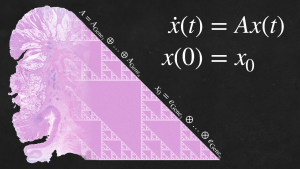Mathematical Modeling
Cancer can arise via multiple pathways. To systematically describe carcinogenesis we aim to design a mathematical framework that can be built in a modular way and that is medically interpretable. In collaboration with mathematicians from EMCL at Heidelberg University and HITS Heidelberg (Saskia Haupt, Alexander Zeilmann, Valentin Schmid, Head: Vincent Heuveline), we model the development of colorectal cancer in Lynch syndrome, the most common hereditary colorectal cancer syndrome, and its consequences on prevention, diagnosis and treatment.
More information about the project can be found under:
https://emcl.iwr.uni-heidelberg.de/research/projects/mathematical-oncology
Engineering Mathematics and Computing Lab (EMCL)
Prof. Dr. Vincent Heuveline, IWR, Heidelberg University
Saskia Haupt, IWR, Heidelberg University
Alexander Zeilmann, IWR, Heidelberg University
Valentin Schmid, IWR, Heidelberg University
https://emcl.iwr.uni-heidelberg.de/research/projects/mathematical-oncology

Colorectal cancer incidences in Lynch syndrome: a comparison of results from the prospective lynch syndrome database and the international mismatch repair consortium. Hered Cancer Clin Pract. 2022 Oct 1;20(1):36. PMID: 36182917
S. Haupt, N. Gleim, A. Ahadova, H. Bläker, M. Knebel Doeberitz, M. Kloor, V. Heuveline: A computational model for investigating the evolution of colonic crypts during Lynch syndrome carcinogenesis. Computational and Systems Oncology, June 2021.
Mathematical modeling of multiple pathways in colorectal carcinogenesis using dynamical systems with Kronecker structure. PLoS Comput Biol. 2021 May 18;17(5):e1008970. PMID: 34003820
The shared frameshift mutation landscape of microsatellite-unstable cancers suggests immunoediting during tumor evolution. Nat Commun. 2020 Sep 21;11(1):4740. PMID: 32958755
. Age-dependent performance of BRAF mutation testing in Lynch syndrome diagnostics. Int J Cancer. 2020 Nov 15;147(10):2801-2810. PMID: 32875553
Involved researchers



